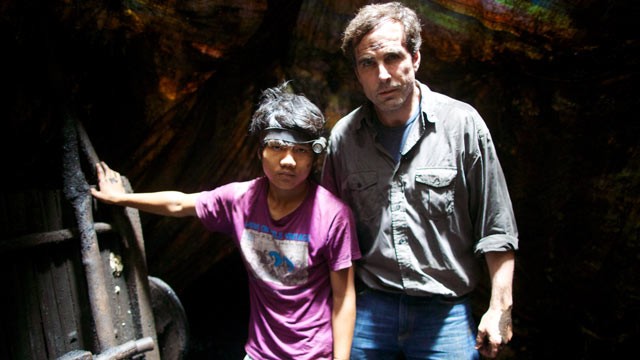 ABC's Bob Woodruff poses with 17-year-old Pemba Tamang, a coal miner in the Indian state of Meghalaya. (Jake Whitman/ABC)
ABC's Bob Woodruff poses with 17-year-old Pemba Tamang, a coal miner in the Indian state of Meghalaya. (Jake Whitman/ABC)By BOB WOODRUFF (@bobwoodruff) and JAKE WHITMAN
KHLIEHRIAT, India June 17, 2013
Deep in the mountains of Northeast India, the workday begins with a
treacherous, five-story climb down slippery bamboo ladders, with no
safety gear and no emergency exits.
The young coal miner leading the way is named Pemba Tamang, a 17-year-old boy who has been working here since he was just 12 years old.
Along with hundreds of other children who are desperate enough, and
small enough, he works this dangerous underground system of tunnels
nicknamed "rat holes."The children who work here are lured by the promise of good wages in a region where one in four young people are unemployed. They will work eight hours a day, six days a week, for the equivalent of a few U.S. dollars per day.
To meet these young miners, we traveled to the Indian state of Meghalaya, a region rich in coal in a country desperate for it-- India relies on coal for nearly half its electricity.
We traveled with Rosanna Lyngdoh, a co-founder of the nongovernmental group Impulse.
In 2010, Impulse discovered hundreds of children -- some as young as 9 -- working in the surrounding mines. Three years after the problem was first exposed, it is still easy to find children working in dangerous and often deadly conditions.
"There's a human rights violation everywhere here, you can see that." Lyngdoh told us.
Tamang is one of the boys Lyngdoh and her group has been following. He has been working in the mines for nearly five years, drawn to the occupation after his father, who was also a coal miner, died from health problems, leaving Tamang with nothing.
Tamang said he begins his work each day at 5 a.m. by climbing into the giant pits, some hundreds of feet deep. He will then crawl into the small openings at the bottom, which stretch horizontally into the earth, and dig for coal for up to eight hours a day.
Tamang can expect to collect about two cart loads per day, worth about 500 rupees, or roughly $8.60.
This kind of child labor is banned under India's Mines Act of 1952. The law prohibits anyone under age 18 from working in the country's coal mines.
But enforcing the law is complicated, since it is left up to each state.
Also, India's Constitution says the tribal and native people have first say over the land -- opening the door for those eager to make money in the coal-rich state.
Because the children are small, they fit easily into the small tunnels, often no more than two feet high.
Young miners we met during our visit shared stories of horrific accidents -- roof collapses that killed fellow workers. Often those trapped have no way out, and little effort is made to save them.
Our visit coincided with the beginning of monsoon season in Northeast India, which brings the added threat of flash flooding. The region is also at high risk for a major earthquake. Tremors are felt nearly every day.
Tamang took "Nightline" into the confusing and dangerous system of tunnels -- a frightening journey lead only by dim flashlights.
He also shares with us his dream for the future, by taking us to a local school, to meet the reason he continues to risk his life every day.







0 comments:
Post a Comment